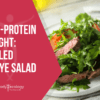One Simple Way to Reduce the Risk of Weight Gain, Diabetes, and Heart Disease
Studies show that—across all ages—those who skip breakfast also snack more, eat more during mealtime, and are at a greater risk for developing chronic disease, like type 2 diabetes and heart disease.
Irregular breakfast habits are also associated with a poor attention span and learning deficits.
5 Good Reasons NOT to Skip Breakfast
1. Scattered Attention, Cognitive Decline, and Poor Memory

Kids that eat breakfast regularly have been proven to thrive in a learning environment. Eating breakfast can help to improve visual memory and attention span in children.
Many studies with children show what you would expect: Breakfast gives children the fuel that they need to thrive in a learning environment. (1) One study, published in 2012 in the European Journal of Clinical Nutrition, found that skipping breakfast reduced attention span and visual memory in children. (2)
Research out of Cardiff University took a sample of over 800 nurses and found that those who ate breakfast had lower stress, fewer cognitive failures, and fewer injuries and accidents at work. (3)
2. Weight Gain and Belly Fat
In a study published early this year, researchers investigated the impact of breakfast—and skipped breakfast—on body composition. (4) Pulling information from 236 healthy adolescent volunteers, they found that those who ate breakfast at least five times a week had significantly lower body weight and waist circumference compared those who skipped breakfast.
Elsewhere, researchers at the School of Public Health in Minneapolis observed that breakfast reduces the risk of obesity and chronic disease—like type 2 diabetes—in both children and adults. (5) According to the study, skipping breakfast increases appetite and makes it harder to control blood sugar.
3. Unhealthy Snacking
At the University of Sienna in Italy, researchers found that adolescent children—ages 11 to 15 years old—with irregular breakfast habits were found to eat less fruit and vegetables on a daily basis. (6)
Researchers at the Harvard School of Public Health discovered that skipping breakfast and snacking throughout the day was associated with an increased risk for type 2 diabetes in men. (7) And indeed, a review of the scientific literature shows that skipping breakfast leads to increased appetite—including poor quality snacking. (8)
4. Heart Disease
This year, researchers at the Harvard School of Medicine published a large study that looked at the eating habits of roughly 27,000 men, age 45 and older. (9) All men worked in the field of healthcare and were free of heart disease and cancer.
During 16 years of follow-up, researchers found that men who skipped breakfast had a 27% higher risk of heart disease compared to men who did not.
5. Type 2 Diabetes
Another large study was published this year out of Harvard Medical School—this time with women. (10) In 2002, researchers took a sample of just over 46,000 women who were free of type 2 diabetes, heart disease, and cancer. After following the women for six years, they found 1,560 cases of type 2 diabetes. After adjusting the statistics for bias and error, they concluded that women who ate breakfast irregularly (0–6 times a week) were at a higher risk for type 2 diabetes than women who ate breakfast every single morning.
Consistency is key when it comes to lowering risk of type 2 diabetes. Women who ate breakfast inconsistently were at a greater risk for type 2 diabetes because of added stress on the body and inability to sustain balanced blood sugar levels.
Autumn Breakfast Ideas
As the months grow cooler, you may find that you are naturally attracted to warm food and warming spices. But the reality is that breakfast is the one meal of day that should always be warm.
According to the principles of Chinese medicine, digestion belongs to the Earth element—or Spleen and Stomach energy. The Earth element decides how well you extract nutrients from food. It also decides how well you convert these nutrients into usable daily energy. Physical prowess and mental stamina are also governed by Earth energy.
Cold or raw foods thwart your digestive fire. Because Earth energy (or Spleen and Stomach energy) runs strongest during the morning hours, breakfast is the one meal of the day that should be especially warming and easy to digest.
Here are some beneficial breakfast ideas to welcome in the season:
- If you prefer a morning smoothie to rehydrate the body, we suggest adding a small amount of ginger to balance the cold and often raw nature of most smoothie drinks. The only exception to this rule is fermented food. While raw and unheated, fermented foods do not dampen the digestive process. This is why we also suggest using coconut water kefir or Vitality SuperGreen in your morning smoothie.
- The contracting nature of eggs makes them well suited for lunch. But if your morning is full of activity, you may find that a breakfast with animal protein like eggs helps to support sustained energy levels. Eggs are also rich in choline, a nutrient that is essential for brain development and cognitive health.
- When eating eggs or any animal protein for breakfast, follow the Principle of 80/20 to get the most out of the digestive process. Pair eggs with a medley of non-starchy vegetables, such as fermented vegetables, ocean vegetables, or winter greens that have been sautéed with onion and coconut oil.
- We suggest softly scrambling one whole egg plus two yolks in coconut oil or ghee. During the cooler months of the year, have fun cooking with natural antibiotic and anti-yeast herbs like garlic, thyme, and oregano, which also support the body during cold and flu season.
What To Remember Most About This Article:
You’ve been told before that breakfast is the most important meal of the day, but did you know that skipping breakfast can compromise your health and leave you at risk for chronic disease?
Research doesn’t lie. Here are the top 5 reasons not to skip breakfast again:
- Improve memory and attention and prevent cognitive decline.
- Naturally fight weight gain and reduce belly fat.
- Curb appetite and cut back on unhealthy snacking.
- Reduce the risk of heart disease.
- Reduce the risk of type 2 diabetes.
Breakfast is a delicious start to the day that should always be enjoyed warm to support the Earth element, which aids in digestion. Eating cold, raw foods first thing in the morning can compromise the digestive process.
Here are a few handy breakfast ideas to have up your sleeve if you’re pressed for time in the morning:
- Fermented food is the exception to the cold foods rule; whip up a quick breakfast smoothie made with fermented foods like coconut water kefir and Vitality SuperGreen.
- Sustain morning energy with choline-rich eggs for breakfast; don’t forget the Body Ecology Principle of 80/20 and enjoy 20% animal protein with 80% non-starchy veggies.
- Scramble one whole egg with two yolks in coconut oil or ghee; throw in a few natural anti-yeast and antibiotic herbs like thyme, oregano, and garlic to boost flavor and immunity.
- [product id=”1″]
- [product id=”3″]
- [product id=”5″]
REFERENCES:
- Wesnes, K. A., Pincock, C., & Scholey, A. (2012). Breakfast is associated with enhanced cognitive function in schoolchildren: An internet based study. Appetite.
- Maffeis, C., Fornari, E., Surano, M. G., Comencini, E., Corradi, M., Tommasi, M., … & Cortese, S. (2012). Breakfast skipping in prepubertal obese children: hormonal, metabolic and cognitive consequences. European journal of clinical nutrition, 66(3), 314-321.
- Chaplin, K., & Smith, A. P. (2011). Breakfast and snacks: associations with cognitive failures, minor injuries, accidents and stress. Nutrients, 3(5), 515-528.
- Nurul-Fadhilah A, Teo PS, Huybrechts I, Foo LH (2013) Infrequent Breakfast Consumption Is Associated with Higher Body Adiposity and Abdominal Obesity in Malaysian School-Aged Adolescents. PLoS ONE 8(3): e59297.
- Pereira, M. A., Erickson, E., McKee, P., Schrankler, K., Raatz, S. K., Lytle, L. A., & Pellegrini, A. D. (2011). Breakfast frequency and quality may affect glycemia and appetite in adults and children. The Journal of nutrition, 141(1), 163-168.
- Lazzeri, G., Pammolli, A., Azzolini, E., Simi, R., Meoni, V., de Wet, D. R., & Giacchi, M. V. (2013). Association between fruits and vegetables intake and frequency of breakfast and snacks consumption: a cross-sectional study. Nutrition journal, 12(1), 123.
- Mekary, R. A., Giovannucci, E., Willett, W. C., van Dam, R. M., & Hu, F. B. (2012). Eating patterns and type 2 diabetes risk in men: breakfast omission, eating frequency, and snacking. The American journal of clinical nutrition, 95(5), 1182-1189.
- Giovannini, M., Agostoni, C., & Shamir, R. (2010). Symposium overview: do we all eat breakfast and is it important?. Critical reviews in food science and nutrition, 50(2), 97-99.
- Cahill, L. E., Chiuve, S. E., Mekary, R. A., Jensen, M. K., Flint, A. J., Hu, F. B., & Rimm, E. B. (2013). Prospective Study of Breakfast Eating and Incident Coronary Heart Disease in a Cohort of Male US Health Professionals. Circulation, 128(4), 337-343.
- Mekary, R. A., Giovannucci, E., Cahill, L., Willett, W. C., van Dam, R. M., & Hu, F. B. (2013). Eating patterns and type 2 diabetes risk in older women: breakfast consumption and eating frequency. The American journal of clinical nutrition.








